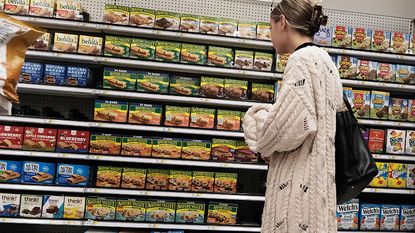US inflation drops to 7.7%
Costs for rents increased, but the price of cars, clothes and medical care helped slow the rate of inflation in the US


US inflation slowed in October.
The consumer price index rose 7.7% year on year in October, the smallest annual increase since the start of the year.
The figure is below the 8% forecast by economists and down from 8.2% last month.
Subscribe to MoneyWeek
Subscribe to MoneyWeek today and get your first six magazine issues absolutely FREE

Sign up to Money Morning
Don't miss the latest investment and personal finances news, market analysis, plus money-saving tips with our free twice-daily newsletter
Don't miss the latest investment and personal finances news, market analysis, plus money-saving tips with our free twice-daily newsletter
This reading suggests inflation might have peaked, taking pressure off the Federal Reserve, America’s central bank, which has been trying to combat rising prices by hiking interest rates.
Currently, interest rates in the US sit at 4% after a 0.75% hike last week, their highest level since early 2008.
While Federal Reserve chair Jerome Powell has warned that rates will need to rise further to curtail inflation, the slowdown has ignited speculation the Fed will slow the pace of increases in the coming months.
Why did US inflation decrease?
A lower than expected rise in rent and housing costs was the main reason for the slowdown in US inflation last month.
That said, the property market in the US remains hot, so it could take some time before prices come down sustainably.
Car prices, costs for clothes, medical care and airline fares all declined. The price of food has also stopped rising as quickly as it was before and energy prices in the US have been lower than in Europe, as it’s far less reliant on foreign gas and oil.
However petrol prices did increase slightly, and restaurant prices and hotel rates also remain high.
UK inflation figures are due out 16 November, however the latest data from the Office for National Statistics showed today the economy shrank 0.2% as we head towards a recession.
How did the markets react?
Investors welcomed the figures, with share prices rising in the US, Europe and Asia.
The S&P 500 index rose 5.5% after the data was published, and the Nasdaq Composite index closed 7.4% higher.
Hong Kong’s Hang Seng index rose 5.5%, China’s CSI 300 index gained 1.9% and Tokyo’s Topix index 1.8%.
In Europe the Stoxx 600 gained 2.7%, while the FTSE 100 and the FTSE 250 gained 1% and 3.9% respectively.
The dollar fell 2.3%, while sterling jumped over three cents to $1.17.
Nic studied for a BA in journalism at Cardiff University, and has an MA in magazine journalism from City University. She joined MoneyWeek in 2019.
-
-
 Investment trust discounts hit 2008 levels. Here’s how to profit
Investment trust discounts hit 2008 levels. Here’s how to profitInvestment trust discounts have risen to levels not seen since 2008, here are three trusts looking to buy to profit.
By Rupert Hargreaves Published
-
 A luxury stock to buy at a high street price
A luxury stock to buy at a high street priceInvestors wrongly consider Watches of Switzerland a high-street outlet.
By Dr Matthew Partridge Published
-
 UK wage growth hits a record high
UK wage growth hits a record highStubborn inflation fuels wage growth, hitting a 20-year record high. But unemployment jumps
By Vaishali Varu Published
-
 UK inflation remains at 8.7% ‒ what it means for your money
UK inflation remains at 8.7% ‒ what it means for your moneyInflation was unmoved at 8.7% in the 12 months to May. What does this ‘sticky’ rate of inflation mean for your money?
By John Fitzsimons Published
-
 VICE bankruptcy: how did it happen?
VICE bankruptcy: how did it happen?Was the VICE bankruptcy inevitable? We look into how the once multibillion-dollar came crashing down.
By Jane Lewis Published
-
 Would a food price cap actually work?
Would a food price cap actually work?Analysis The government is discussing plans to cap the prices of essentials. But could this intervention do more harm than good?
By Nicole García Mérida Published
-
 What is Warren Buffett’s net wealth?
What is Warren Buffett’s net wealth?Features Warren Buffett is one of the world’s richest people. But how did he make his money?
By Jacob Wolinsky Last updated
-
 What is Rihanna's net worth?
What is Rihanna's net worth?Features Rihanna became the youngest self-made billionaire in 2022. Here’s how she made her money.
By Jacob Wolinsky Published
-
 UK inflation slides to 8.7% - what does it mean for your money?
UK inflation slides to 8.7% - what does it mean for your money?News Inflation has dropped below 10% for the first time in months, but with food prices at a 45-year high, is this good news and what does it mean for your money?
By Tom Higgins Published
-
 What is Bill Gates's net worth?
What is Bill Gates's net worth?Features Bill Gates is one of the world’s richest people, but how did he make his money?
By Jacob Wolinsky Last updated









